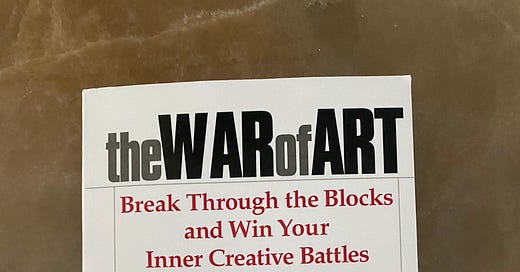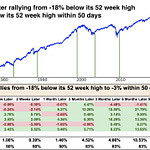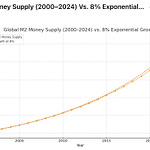To investors,
I have been reading one book per week this year. This past week’s book was The War of Art by Steven Pressfield. Highly recommend reading it. If you are interested in the individual highlights that I made in the physical book, you can read those here. Hope you enjoy these notes every Monday morning.
Book’s main argument:
The world is littered with people who dream, but very few who have the courage to act. You can see this highlighted in every industry. Pressfield assigns a name to the friction that prevents action — Resistance — and then unpacks how you can overcome whatever you are facing, so you can produce your best work. This book is part motivation, part psychology lesson. It is worth reading every page.
5 Big Ideas:
💡 Idea #1 — Everyone has a talent that arms them with the ability to create something valuable for the world. Very few people act on this talent because they give in to “Resistance.” Pressfield writes:
There’s a secret that real writers know that wannabe writers don’t, and the secret is this: It’s not the writing part that’s hard. What’s hard is sitting down to write. What keeps us from sitting down is Resistance.
People claim to be ignorant to what Resistance is. You may have never heard the name before, but you know what the friction is. It has beaten you before. You are human, so Resistance has won at least once. The goal is become the master of Resistance.
Are you a writer who doesn’t write, a painter who doesn’t paint, an entrepreneur who never starts a venture? Then you know what Resistance is.
Resistance is the most toxic force on the planet. It is the root of more unhappiness than poverty, disease, and erectile dysfunction. To yield to Resistance deforms our spirit. It stunts us and makes us less than we are and were born to be.
The goal of Resistance is to simply prevent you from doing your work. Pressfield writes:
Resistance cannot be seen, touched, heard, or smelled. But it can be felt. We experience it as an energy field radiating from a work-in-potential. It’s a repelling force. It’s negative. Its aim is to shove us away, distract us, prevent us from doing our work.
Resistance is not a peripheral opponent. Resistance arises from within. It is self-generated and self-perpetuated. Resistance is the enemy within.
Resistance will tell you anything to keep you from doing your work.
💡 Idea #2 — Pay attention when you fear something. It is a good sign that you should attack that activity with an immense level of enthusiasm. You will be surprised by the positive impact of completing the task. Pressfield writes:
The counterfeit innovator is wildly self-confident. The real one is scared to death.
Remember our rule of thumb: The more scared we are of a work or calling, the more sure we can be that we have to do it.
If you’re paralyzed with fear, it’s a good sign. It shows you what you have to do.
💡 Idea #3 — There is one strategy that continually defeats Resistance. You must turn pro at your specific craft. If you do this, you have a shot of conquering Resistance. Pressfield writes:
Aspiring artists defeated by Resistance share one trait. They all think like amateurs. They have not yet turned pro.
Resistance hates it when we turn pro.
Turning pro means that you are disciplined and focused.
Someone once asked Somerset Maugham if he wrote on a schedule or only when struck by inspiration. “I write only when inspiration strikes,” he replied. “Fortunately it strikes every morning at nine o’clock sharp.”
The act of turning pro is not just a nice idea, but rather a serious commitment. Pressfield writes:
Qualities that define us as professionals: (1) We show up every day, (2) We show up no matter what, (3) We stay on the job all day, (4) We are committed over the long haul, (5) The stakes for us are high and real, (6) We accept remuneration for our labor, (7) We do not over identify with our jobs, (8) We master the technique of our jobs, (9) We have a sense of humor about our jobs, (10) We receive praise or blame in the real world.
You have to be focused and avoid entertaining Resistance. Don’t even allow it to open the door.
The amateur believes he must first overcome his fear; then he can do his work. The professional knows that fear can never be overcome. He knows there is no such thing as a fearless warrior or a dread-free artist.
The professional knows that Resistance is like a telemarketer; if you so much as say hello, you’re finished. The pro doesn’t even pick up the phone. He stays at work.
There is no secret to turning pro. Pressfield writes:
There’s no mystery to turning pro. It’s a decision brought about by an act of will. We make up our mind to view ourselves as pros and we do it. Simple as that.
💡 Idea #4 — You have to ignore the haters. They will always surface as you build momentum. The professional understands why they are haters and chooses to keep working. Pressfield writes:
An amateur lets the negative opinion of others unman him. He takes external criticism to heart, allowing it to trump his own belief in himself and his work. Resistance loves this.
The professional cannot allow the actions of others to defIne his reality. Tomorrow morning the critic will be gone, but the writer will still be there facing the blank page. Nothing matters but that he keep working.
The professional learns to recognize envy-driven criticism and to take it for what it is: the supreme compliment. The critic hates most that which he would have done himself if he had had the guts.
💡 Idea #5 — Consistency is essential to defeating Resistance. Without consistency, you will self-sabotage. Do the work. Sit down. Be consistent. Pressfield writes:
The most important thing about art is to work. Nothing else matters except sitting down every day and trying.
When we sit down each day and do our work, power concentrates around us. The Muse takes note of our dedication. She approves. We have earned favor in her sight.
When we sit down and work, we become like a magnetized rod that attracts iron filings. Ideas come. Insights accrete.
Pressfield believes that the classic advice of “you can be whatever you want to be” is flawed. He explains:
We can’t be anything we want to be. We come into this world with a specific, personal destiny. We have a job to do, a calling to enact, a self to become. We are who we are from the cradle, and we’re stuck with it.
Finally, don’t be a hack. Don’t try to outsmart yourself.
I learned this from Robert McKee. A hack, he says, is a writer who second-guesses his audience. When the hack sits down to work, he doesn’t ask himself what’s in his own heart. He asks what the market is looking for.
The hack condescends to his audience. He thinks he’s superior to them. The truth is, he’s scared to death of them or, more accurately, scared of being authentic in front of them, scared of writing what he really feels or believes, what he himself thinks is interesting. He’s afraid it won’t sell. So he tries to anticipate what the market (a telling word) wants, then gives it to them.
Memorable quotes:
Most of us have two lives. The life we live, and the unlived life within us.
“The enemy is a very good teacher.” - the Dalai Lama
Resistance is always lying and always full of shit.
Individuals who are realized in their own lives almost never criticize others. If they speak at all, it is to offer encouragement.
It’s one thing to lie to ourselves. It’s another thing to believe it.
The professional endures adversity.
Resistance feeds on fear.
We fear discovering that we are more than we think we are.
To labor in the arts for any reason other than love is prostitution.
In the end the question can only be answered by action. Do it or don’t do it.
Pomp’s Takeaways:
This book is powerful. It is a quick read and hammers home the point that you must learn to act in the face of fear or Resistance. While many of you are not writers or creatives, the lessons published by Steven Pressfield will apply to almost any role or industry.
My first big takeaway from the book was how common procrastination and fear have become in society. Maybe it was always like this, but the modern age of social media has magnified the issue. There are people every day who tweet or post about their grand vision or dream, yet they never make any progress. You must resist confusing motion with progress. By creating a label for this problem — Resistance — Pressfield is able to draw a line in the sand. Resistance is the enemy and we must focus on beating it every day.
My second big takeaway was the idea of “going pro.” I had never thought of various activities or tasks as amateur or professional. They were just things that I did on a daily basis. Take this letter that I write every morning — am I a professional writer or just an amateur? You could argue either, but my work will be exponentially better if I decide to be a pro. This little decision can have profound impact. It also means that you can become a pro at numerous things. Take pride in your work.
My third big takeaway was the classic battle between art and business. You can create things for money or you can create them for the sake of creating. I have personally struggled with this many times in my career. While I am a professional businessman and investor, there is a side to my work that feels like art. The more I have crossed those two activities, the less enjoyable they become. Given my recent announcement about removing advertising from the podcast and YouTube videos, I realized that I have been able to clearly define what is art and what is business. It is exciting to see how that affects my enjoyment level of content creation in the future.
My fourth and final takeaway was that everyone should create something and put it out into the world. It can be writing, singing, talking, building, or a plethora of other activities. We each have unique skills and interests. Use them to create something and then subject yourself to public feedback. Pressfield put it best when he ends the book with the following quote:
Creative work is not a selfish act or a bid for attention on the part of the actor. It’s a gift to the world and every being in it. Don’t cheat us of your contribution. Give us what you’ve got.
This book can be read in a single day. It feels like a book that I will revisit often though. We all battle Resistance on a regular basis. Become a pro, sit down, and get to work.
As I mentioned, this past week’s book was The War of Art by Steven Pressfield. Highly recommend reading it. If you are interested in the individual highlights that I made in the physical book, you can read those here. Hope you enjoy these notes every Monday. Feel free to leave a comment - I read all of them.
-Pomp
Note: Make sure you are subscribed to receive these personal notes each Monday morning.
Announcement: I am hosting a conference at the Miami Beach Convention Center on March 4, 2023. The goal is to bring together people from different walks of life to debate important ideas that impact our society on a daily basis. The speakers are many of the most popular guests from the podcast over the last few years, along with a few surprises. If you’re interested in attending, you can read about the event details here:
TICKETS: https://www.lyceummiami.com/
You are receiving The Pomp Letter because you either signed up or you attended one of the events that I spoke at. Feel free to unsubscribe if you aren’t finding this valuable. Nothing in this email is intended to serve as financial advice. Do your own research.












Share this post